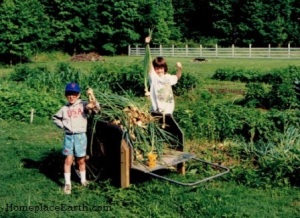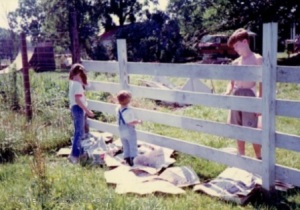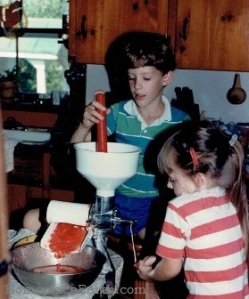Put Your Children To Work
 Summer is upon us and it is relatively quiet at my house. It wasn’t always that way. My husband and I raised four children–the oldest was thirteen when the youngest was born. Summers meant lots of activity and a full table for lunch every day. I was the stay-at-home parent and had no desire to haul the kids around to keep them entertained. We had plenty to do at home.
Summer is upon us and it is relatively quiet at my house. It wasn’t always that way. My husband and I raised four children–the oldest was thirteen when the youngest was born. Summers meant lots of activity and a full table for lunch every day. I was the stay-at-home parent and had no desire to haul the kids around to keep them entertained. We had plenty to do at home.
I wanted my children to be productive members of our family and, from a young age, gave them opportunities to do that. They were responsible for keeping their rooms clean, picking up after themselves, bringing firewood up to the house in the winter as needed, and doing things when asked, such as setting the table or folding clothes while they watched TV. Those are the things I can think of off the top of my head (the youngest is 28 and the oldest is 41, so it’s been awhile). I’m sure they could add to the list. Actually, setting the table was usually the job for the youngest. When we moved to this house in 1984 I put the dinner dishes on a shelf in a low cupboard so that our daughter, age 2, could reach them and set the table by herself. I believe they were all grown before I got around to moving the dishes to an upper cabinet.
Summertime, however, was different. There was garden work to do, and plenty of it. I told them they had to give me an hour of their time each weekday—even the little ones. The first week after school was out (they went to the school that sent a yellow bus around every day), I let them sleep in and decide when they would put in their hour. Since the work was usually in the garden it didn’t take them the whole week to decide it was better to get up early and put in their hour before it got too hot. I remember someone telling me they were happy their children were on the swim team because it got them out of bed every morning to be at practice by 9. When a public pool was built nearby, we joined and our children went there, but not because of swim team. They all learned how to swim and, to this day, prefer rivers to pools anyway.
 I would choose age-appropriate jobs for each of them. They would weed, mulch, and pick. They learned entomology when we identified insects in the garden, deciding if they were good or bad ones. In order to keep the Mexican bean beetles and Colorado potato beetles in check, I would pay them a penny for each beetle they picked off the beans or potatoes and a nickel for each egg cluster they smashed. Let me tell you, a child who struggles with math in the classroom has no problem adding numbers in his head to tell you how much he is owed under these circumstances. Sometimes their job was to paint the fence.
I would choose age-appropriate jobs for each of them. They would weed, mulch, and pick. They learned entomology when we identified insects in the garden, deciding if they were good or bad ones. In order to keep the Mexican bean beetles and Colorado potato beetles in check, I would pay them a penny for each beetle they picked off the beans or potatoes and a nickel for each egg cluster they smashed. Let me tell you, a child who struggles with math in the classroom has no problem adding numbers in his head to tell you how much he is owed under these circumstances. Sometimes their job was to paint the fence.
We were all in the garden at the same time, and it took some managing on my part to keep everyone at their job—happily (which was a requirement). By the time their hour was up, they had thought of enough things to do to keep themselves occupied for the rest of the day. Legos were a part of their lives, especially on hot afternoons, but they were also free to make things, spend time in our small woods, play with neighborhood friends, and when they got old enough, ride their bikes to Ashland—about 3½ miles away. Of course, those were the days before video games. The TV was turned on for shows like Reading Rainbow, Secret City (an art show), and sometimes they watched a cooking show.
 On the days there were things to can, especially snap beans and tomatoes, they were expected to help with that. Sometimes it was in addition to the garden work, and sometimes it was instead of. We would all sit around the table and talk while we worked. I remember having a young one in the high chair with his/her own knife and cutting board. The work got done and it never required anyone ever getting any stitches. By the time the second oldest learned to read I would choose books from the library that the two oldest could read and let them take turns reading a chapter at a time while the rest of us worked on the beans. It gave the reader a break from the beans, honed his reading skills, and kept everyone quiet and interested. It was a pleasant time. With the tomatoes, they washed, quartered (more knife work) and sometimes worked the Victorio strainer.
On the days there were things to can, especially snap beans and tomatoes, they were expected to help with that. Sometimes it was in addition to the garden work, and sometimes it was instead of. We would all sit around the table and talk while we worked. I remember having a young one in the high chair with his/her own knife and cutting board. The work got done and it never required anyone ever getting any stitches. By the time the second oldest learned to read I would choose books from the library that the two oldest could read and let them take turns reading a chapter at a time while the rest of us worked on the beans. It gave the reader a break from the beans, honed his reading skills, and kept everyone quiet and interested. It was a pleasant time. With the tomatoes, they washed, quartered (more knife work) and sometimes worked the Victorio strainer.
One of the best things that came out of summers at home with the kids was the Summer Lunch Café and it wasn’t a work requirement. When he was about eleven, our oldest came up with the idea to make lunch, with the help of his brother, age seven. They had decided to play “restaurant” and, on their own, found all the choices in the kitchen for lunch and made a menu, which, among other things, included all the condiments in the fridge. When their restaurant opened, they seated me and their little sister and took our order. I don’t remember what we had that day—it could have been peanut butter and jelly sandwiches. What I do remember is that it was a nice break from me making lunch and we all had a good time.
The children continued to play restaurant whenever the spirit moved them during the summer, with the next in line moving up to either helper or manager as the older ones got “real” jobs elsewhere. By the time Betsy (third child and only girl) was in charge, with her younger brother as helper, the oldest (Jarod) had his own lawn business and would occasionally be home for lunch when he was working in the area. Betsy was the one who named it the Summer Lunch Café and would put a tip jar out if Jarod was there. Often he would ask her in the morning if the Summer Lunch Café was going to be open that day and was happy to enjoy what he had started so long ago.

Although it was often through garden work that my children contributed to the household each day, I would sometimes give them the choice of housework. They could choose to dust and sweep the living room or clean the bathroom instead of putting in their time in the garden that day. Cooking could be an option for your kids to contribute to the household. My kids came up with the Summer Lunch Café on their own and enjoyed watching the cooking show on PBS (I don’t remember which one). With the proliferation of cooking shows on TV, sometimes involving children, your children may be inspired to make dinner on a regular basis, or at least help, as their contribution to your household. Just like with me in the garden with all the kids at once, it would take some guidance and management on your part, but the skills they come away with will be with them forever.
When I started selling produce in 1992 I hired whoever was a young teen at the time to be my paid helper on market days. There was still the “one hour for the family at no pay” requirement on the other days. If you ask my grown children today, they will probably tell you that they had more chores than their friends did at the time, but they have no regrets. When they were old enough to get a “real” job they already knew how to follow directions and to keep at a job until it was done. I received good feedback from their bosses, who said that wasn’t always the case with young employees.
To describe those summers when our children were growing up as busy would be an understatement, and I wouldn’t trade them for the world. I know times have changed and there are many distractions in this digital age, but I hope you take the time to arrange regular occasions to have your children do meaningful work alongside you this summer. You will get to know each other in a way you couldn’t otherwise.

